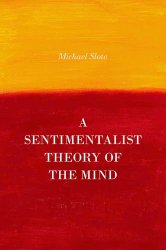April 23, 2014

A Sentimentalist Theory of the Mind by Michael Slote (Oxford University Press, USA, 2014)
(amazon.co.uk)
Book description from the publisher:
Michael Slote argues that emotion is involved in all human thought and action on conceptual grounds, rather than merely being causally connected with other aspects of the mind. This kind of general sentimentalism about the mind goes beyond that advocated by Hume, and the book’s main arguments are only partially anticipated in German Romanticism and in the Chinese philosophical tendency to avoid rigid distinctions between thought and emotion. The new sentimentalist philosophy of mind Slote proposes can solve important problems about the nature of belief and action that other approaches — including Pragmatism — fail to address.
In arguing for the centrality of emotion within philosophy of the mind, A Sentimentalist Theory of the Mind continues the critique of rationalist philosophical views that began with Slote’s Moral Sentimentalism (OUP, 2010) and continued in his From Enlightenment to Receptivity (OUP, 2013). This new book also delves into what is distinctive about human minds, arguing that there is a greater variety to ordinary human motives than has been recognized and that emotions play a central role in this complex psychology.
Comments (0)
- new books,philosophy of mind
April 21, 2014

Origins of Language: A Slim Guide by James R. Hurford (Oxford University Press, USA, 2014)
(kindle ed.), (amazon.co.uk), (UK kindle ed.)
Book description from the publisher:
Origins of Language: A Slim Guide offers a concise and accessible overview of what is known about the evolution of the human capacity for language. Non-human animals communicate in simple ways: they may be able to form simple concepts, to feel some limited empathy for others, to cooperate to some extent, and to engage in mind-reading. Human language, however, is characterized by its ability to efficiently express a wide range of subtle and complex meanings. After the first simple beginnings, human language underwent an explosion of complexity, leading to the very complicated systems of grammar and pronunciation found in modern languages.
Jim Hurford looks at the very varied aspects of this evolution, covering human prehistory; the relation between instinct and learning; biology and culture; trust, altruism, and cooperation; animal thought; human and non-human vocal anatomy; the meanings and forms of the first words; and the growth of complex systems of grammar and pronunciation. Written by an internationally recognized expert in the field, it draws on a number of disciplines besides linguistics, including philosophy, neuroscience, genetics, and animal behaviour, and will appeal to a wide range of readers interested in language origins and evolution.
Google Books preview:
See also: Author’s homepage
Comments (0)
- human evolution,language,new books




